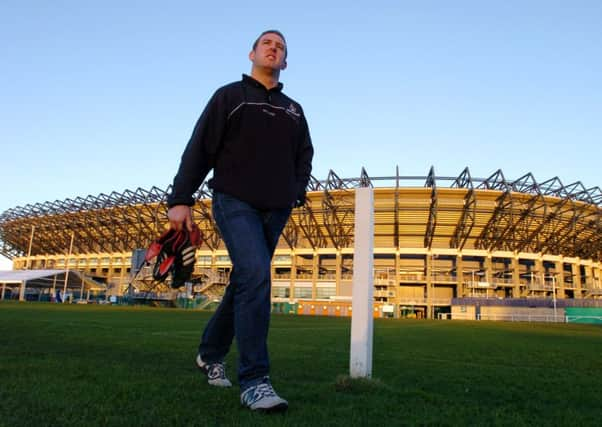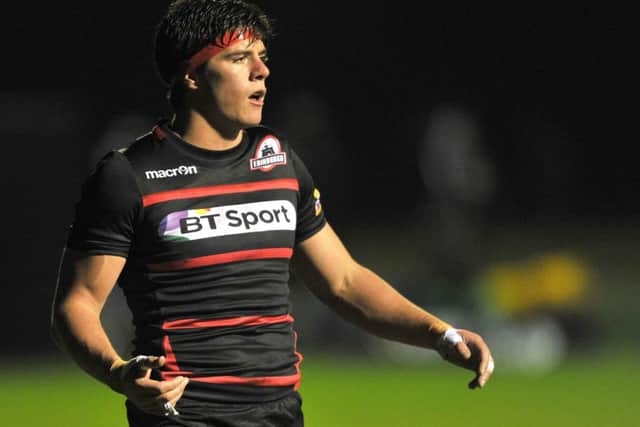Six Nations: Hugh Blake has point to prove - Laney


When it comes to taming the howling gale of Scottish rugby outrage, few are better placed to offer advice than Brendan Laney.
Perhaps the most controversial figure to represent the nation since the dawn of professionalism, the New Zealander, eligible for Scotland thanks to a Glasgow-born grandmother, found himself thrust into the limelight and the line-up just eleven days after stepping off the plane from his homeland in November 2001.
Advertisement
Hide AdAdvertisement
Hide AdIntent merely on devoting his best efforts to the Edinburgh side with which he had signed a two-and-a-half-year deal, Laney was soon swept violently away on a turbulent, seat-of-the-pants ride from his provincial haven in Otago to the unforgiving world of international rugby – orchestrated by the former masterminds spearheading the Scottish game, Sir Ian McGeechan and Jim Telfer.


Despite playing less than sixty minutes of an A game since his arrival, injuries and circumstance conspired to see him running out at Murrayfield, a shock debut at full-back against – of all teams – New Zealand.
The Kiwi, then 28, felt ‘blown away’, but the events invoked the fury of a Scottish rugby public that questioned his right to wear the thistle and lamented its connotations for native rivals further down the pecking order.
Worst of all, the sheer velocity of his selection left members of his new team feeling distinctly uneasy.
“The Scottish selection hadn’t entered my mind at the time,” Laney states, reflecting.
“I was there to play for Edinburgh, hoping I could prove my worth and maybe down the track push to play for Scotland. The opportunity had come, be it fast or not, and I certainly wasn’t going to say no.
“I know for a fact there were guys in the team that went to Geech (McGeechan) and said they weren’t very happy about how it happened. I’ve spoken to those guys about that and I can understand where they’re coming from too.
“But the decision had been made by someone else – my theory was: if there’s someone else better, pick them.”
Advertisement
Hide AdAdvertisement
Hide AdLaney, affable and energetic, was a maverick, a crowd-pleaser blessed not with great speed and athleticism, but with that indefinable spark that burns brightest in those reared on an antipodean diet of rugby.
An adoring band of fans back in Otago affectionately dubbed him ‘Chainsaw’ for his propensity to cut through opposition defences.
His showmanship veered wildly between the majestic and the maddening, his performances drawing exaltation and exasperation in equal measure. Seldom was there middle ground. Never was he free from scrutiny.
The contentious tale of Laney was revived this week when Scotland head coach Vern Cotter left many jaws agape in selecting uncapped and unheard-of 22-year-old flanker Hugh Blake in his Six Nations squad.
On loan at Edinburgh since December from Otago, the similarities between openside Blake and his divisive predecessor are immediately apparent.
Like Laney, Blake has yet to feature for his new side. Like Laney, he qualifies through grandparents.
And Blake’s inclusion at the expense of experienced and popular back-rows John Barclay, Kelly Brown and Roddy Grant poured petrol over a fiery debate that has never truly lain dormant since the Kiwi first hit Scottish tarmac fourteen years ago.
Blake, says Laney, by virtue of his heritage and baptism of fire, must learn to handle the publicity and attention that is already coming his way. It isn’t much fun, for instance, when fabled Grand Slam-winners lambast your involvement with the team.
He will have to work that much harder to prove himself.
Advertisement
Hide AdAdvertisement
Hide Ad“I sort of had to (develop a thick skin),” says Laney of his trying introduction to Scottish rugby.
“I was very, very excited to play for Scotland, but it was bloody tough looking in the papers and seeing ex-Scottish players, guys I looked up to, guys I sat and watched with my Dad as a kid like Gavin Hastings and Finlay Calder saying I shouldn’t be playing.
“My wife was sitting in the flat, where she didn’t know anybody at all and in the paper every two minutes was: ‘Brendan Laney shouldn’t be in the Scotland team’.
“I feel sorry for Hugh in a way because he’s been chucked in a position that possibly shouldn’t have happened. But he’s in there and he’s been picked, and Vern, who’s a very astute coach has seen some Test potential, which from a player point of view is pretty exciting.”
Laney holds the young tyro in high regard, and hasn’t hesitated to offer his support.
“I sent him a text saying ‘good luck’ and that I know exactly how he feels – the only thing he can control is playing good rugby,” he adds.
“He’s got a massive future ahead of him – he’ll find the style of rugby over there pretty tough, but he loves the contact, and I think he’s got a real opportunity if he can stay injury-free to be there for a long time.”
The former twenty-cap international has reservations over the eligibility rules that rendered a string of New Zealanders – the Scots among them dubbed the ‘Kilted Kiwis’ – to represent other nations, and the three-year stint an unattached player must spend in a country to become available for Test duty.
Advertisement
Hide AdAdvertisement
Hide AdAs well as Laney, Scotland’s own Sean Maitland is an example of the former, while Gareth Anscombe, the former Chiefs pivot included in Wales’ Six Nations squad, he says, is a victim of the intense competition for places that thwarted his own All Blacks aspirations.
“There are a lot more people taking advantage of the Test rules,” Laney acknowledges.
“Imagine being fifth or sixth in line to the number ten jersey like Anscombe – he thinks he’s not going to get a chance.
“But the opportunity is becoming more and more available for guys to go overseas, it’s being promoted more, and let’s be honest, the money’s bigger.
“We want to see as many Scottish-born players playing for Scotland as we can. That’s one of the reasons ex-players are up in arms.
“But Hugh can’t worry about that; he can’t control who the coach will pick and not pick. He’s got to prove to the people around him that he deserves to be there. People won’t write stuff about his eligibility in columns if he’s playing well.”
FOLLOW US
SCOTSMAN TABLET AND MOBILE APPS